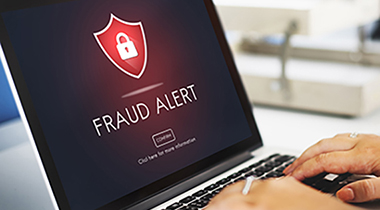Steer Clear of Fraud
Keep your bank accounts secure while traveling this summer.
It's time to take that long awaited family vacation. The last thing you need is fraudulent activity on your
personal financial accounts. In today’s world, it is not enough to just use travelers checks and add a travel notification on your
debit cards. Explore other ways you can
prevent fraud while on vacation, before and during your trip.
Before Traveling:
- Bring one credit card and use that or cash. The chances of losing any credit cards is higher if you bring more. Keep it simple and safe.
- Sign up for online bill pay or automatic bill pay. Having any sensitive documentation or bills with you on a trip, puts you at risk. Keep those home and take care of your bills online.
- Remove any sensitive information from your purse or wallet.
- Put things on hold. Put your mail on “postal hold” stating that for a period of time you wish to have your mail held at the post office. We prefer that term rather than “vacation hold” so that postal clerks will not know that you will be gone. Learn more at: https://holdmail.usps.com/holdmail
- Make your home look lived-in. Arrange for friends or family you trust to pick-up newspapers, mail, and advertisement flyers in order to avoid drawing attention to your home. This will reduce the risk of break-ins which may result in the loss of valuables, including your identity. Nothing says “we’re out of town” more than a pile of newspapers or packages at the doorstep.
- Scan important travel documents and store them in a secure online repository. In the event that your information is lost or stolen, using an online repository allows you to easily access copies of your passport, drivers license, visa, and any other vital identification from anywhere in the world. Remember to do this for every person traveling with you, including children.
- Make copies of your itinerary, passport data page, visas and driver’s license to leave with designated emergency contact
During Travel:
- Don't leave important documents in your car. Very often people leave their important documents in the car thinking that the documents are safe. Your documents will be as safe as your car might be.
- Consider restricting the use of your ATM card to securely located Automated Teller Machines. Fake ATM machines are known to have been placed in high traffic tourist areas. Debit cards also provide thieves with a direct pipeline to your bank accounts. When used with a PIN, you need not sign for the purchase. When used for a "credit" purchase with a signature, no confirming PIN is needed.
- Use credit cards while traveling. Only credit cards are protected by federal law as to the amount of money that you are responsible for if lost or stolen, and most companies now extend a zero liability policy to customers.
- Never leave your personal documents unsecured in the hotel rooms. This rule specially applies to global travel security where certain passports may be valuable. Lock up all valuables in room safes or hotel safes while you are out of your room.
- Back-up material: Carry photocopies of all travel documents including plane tickets, hotel reservations and passports. Keep these in a separate location from the originals.
- Carry valuables safely. Your valuables and identification are a mere swipe away from a purse snatcher or pickpocket. Money belts kept under clothing are the safest. For stowing cash, credit cards and identification, inside pockets and sturdy shoulder bags with straps across the chest are much better than handbags, fanny packs or outside pockets. Vacation travelers should use fanny packs or travel pouches that are worn inside your shirt to carry important documents. Business travelers should be aware that pickpockets are also looking for laptops and PDA's that are temporarily out of your control- at airports, in lobbies and in dining areas
- Be prepared to deal with a lost or stolen passport case. Know what to do immediately in case of stolen or lost passport during your trips or at home to prevent identity theft. Always be prepared for the worst case scenario. Assuming you may lose your passport or other travel and personal information during a trip, be prepared and have a plan 'B' to notify and get passport replacement in order to move on with your travel arrangements. Copies of your birth certificate and passport or phone numbers of your credit card companies come in very handy when you need them, especially, if you're out of town and lose your credit card or passport. So, be prepared and have a contingency plan for any personal document loss, as part of your overall travel security plans.
- Don't check-in your personal documentation. Never place your personal and travel documents in a luggage which you intend to check-in at the airports. Once you do that, you have just lost control over security of your personal documents.
- Take caution with public computers and Wi-Fi. If possible, avoid using public computers to access anything sensitive, such as conducting online banking, making purchases, or accessing email accounts. These computers could potentially have malware that is designed to capture the information you have entered. Avoid these same activities when using a public Wi-Fi connection as the information can easily be captured by criminals on the same connection. Make sure to use an encrypted Internet connection whenever you go online.
- Post to social media once you are back home. We all like to share photos online with our family and friends as we are traveling. However, when you tell people where you are, you are also telling them where you are not – at home.
